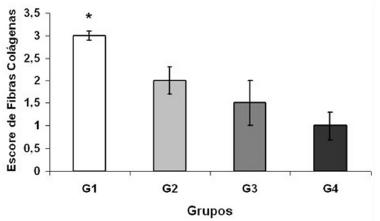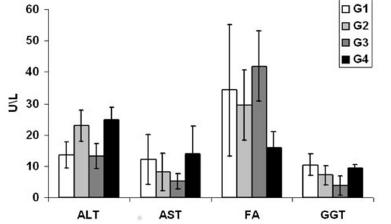ABSTRACT
Background:
Partial hepatectomy is a surgical intervention of the liver that can trigger its regenerative process, where the residual lobes deflagrate a compensatory hyperplasia, causing its restoration almost to the original volume. Nevertheless, depending on the extent of liver damage its regeneration might be impaired. The low-power laser has been studied with beneficial results.
Aim:
To investigate the possible functional and mutagenic damage arising from the use of low-power laser used in liver regeneration after partial hepatectomy.
Methods:
Fifteen male adult Wistar rats were hepatectomizated in 70% and laser irradiated or not with dose of 70 J/cm2, 650 nm, 100 mW, directly on the remaining liver, during the perioperative period. These animals were divided into four groups: G1 (control, 7 days); G2 (laser, 7 days); G3 (control, 14 days); G4 (laser, 14 days). Were analyzed the liver weight; number of hepatocytes; deposition of collagen fibers; liver function tests: serum alanine aminotransferase, aspartate aminotransferase, alkaline phosphatase, gamma glutamyl transferase, bilirubin and micronucleus test in peripheral blood erythrocyte.
Results:
The liver weight was greater in G3 and G4 (p=0.001 and p=0.002) compared to other groups. The deposition of collagen fibers in G1 was statistically higher than the other groups (p=0.01). In tests of liver function and micronucleus test was not found significant differences between the studied groups.
Conclusion:
Low-power laser stimulation did not cause loss of liver function or mutagenic damage.
HEADINGS:
Mutagenesis; Hepatectomy; Liver regeneration; Laser therapy

 0=absent; 1=mild; 2=moderate; 3=pronounced; values=mean and the standard deviation
0=absent; 1=mild; 2=moderate; 3=pronounced; values=mean and the standard deviation
 Values=mean standard deviation; one-way ANOVA and the Tukey post-test; * p<0.05
Values=mean standard deviation; one-way ANOVA and the Tukey post-test; * p<0.05
 Values=mean standard deviation; one-way ANOVA and the Tukey post-test; * p<0.05
Values=mean standard deviation; one-way ANOVA and the Tukey post-test; * p<0.05
 Values=mean standard deviation; one-way ANOVA and the Tukey post-test; * p<0.05
Values=mean standard deviation; one-way ANOVA and the Tukey post-test; * p<0.05